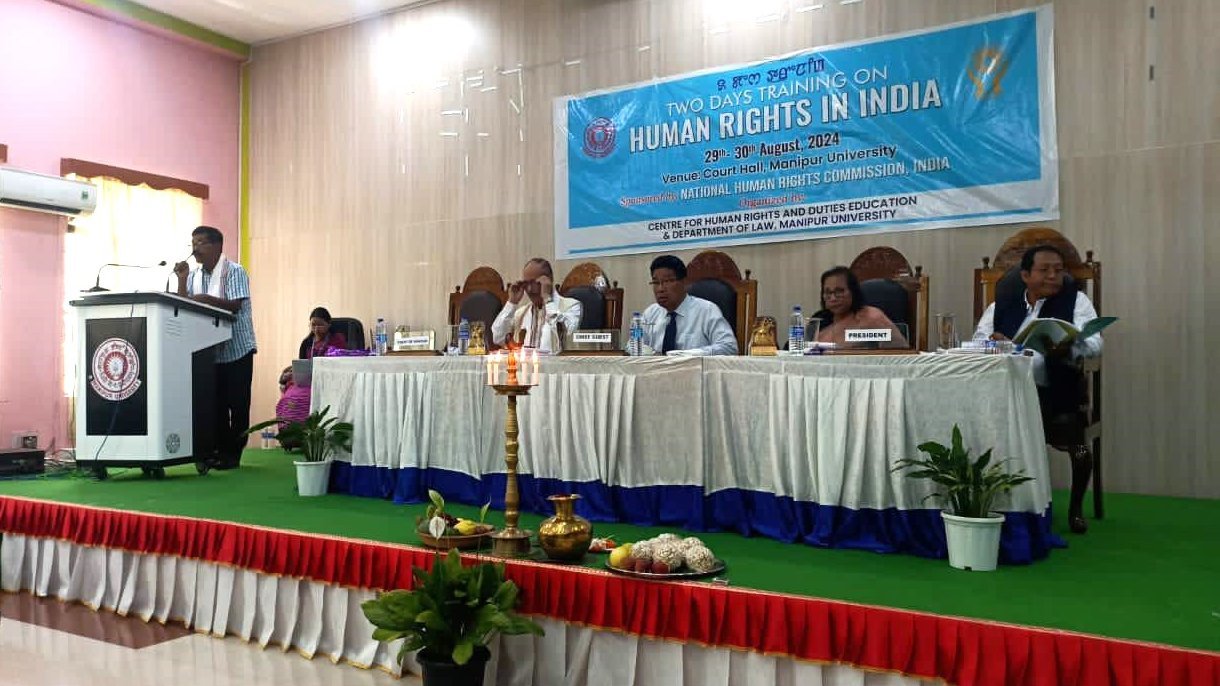Bharat Lal, Secretary General, National Human Rights Commission (NHRC) asserted that upholding Human Rights must be an internal commitment, not an externally imposed duty and reiterated the government’s responsibility in upholding civil, political, cultural, and socio-economic rights.
Lal said this in his valedictory address of the ‘Two-Day Training Programme on Human Rights in India’ which was organised by Centre of Human Rights and Duties Education and Department of Law, Manipur University and sponsored by the NHRC on 29th-30th August 2024.
The Secretary General emphasized the importance of the true meaning of Preamble, Fundamental Rights, and Directive Principles of State Policy. Speaking on constitutional and legal recourse available to citizens for securing justice, especially Article 32 in seeking justice, he stressed the need to foster fraternity among people as enshrined in the Constitution, urging reliance on constitutional and legal provisions rather than violence to achieve justice.
Bharat Lal emphasized that the Preamble, the soul of the Constitution, encapsulates the core ideals of equality, justice, liberty, and fraternity. He asserted that any form of violence is fundamentally a violation of Human Rights, highlighting that war, terrorism, and violence are among the greatest threats to human life and dignity. In his address, he urged students and teachers alike to actively promote peace and respect for human rights of all human beings emphasizing that these efforts are essential for securing prosperity and a bright future for the younger generation.
The Secretary General also highlighted the NHRC’s recent camp sitting in Guwahati, where 25 cases of alleged Human Rights violations in Manipur were addressed. Lal reaffirmed the NHRC’s commitment to protecting and promoting Human Rights for all, calling for collective resolve and sustained efforts to ensure that respecting Human Rights becomes a way of life. He concluded by encouraging partnerships to improve lives and ensure dignity for everyone.

The programme featured eight key sessions addressing critical aspects of human rights. The programme witnessed the participation of over 100 legal experts, academicians, Human Rights Defenders, and students.
On its first day, Prof. Rameshchandra Borpatragohain, former Dean, opened the sessions with an overview of Human Rights principles and practices, followed by Dr. N. Pramod Singh, Associate Professor Dhanamajuri University, who discussed the role of Human Rights institutions in India. Justice Kh. Nobin Singh explored the intersection of Human Rights and the Criminal Justice System, while Keisham Pradipkumar, Chairperson MCPCR, addressed child rights challenges in Manipur. Sobita Mangsatabam, Secretary of Women Action for Development, highlighted the role of NGOs in gender justice, and Meihoubam Rakesh, Director of Human Rights Law Network, Manipur, examined constitutional safeguards on arrest and detention. Rinku Khumukcham, Chief Editor of Imphal Times, discussed the role of media in promoting and protecting human rights.


